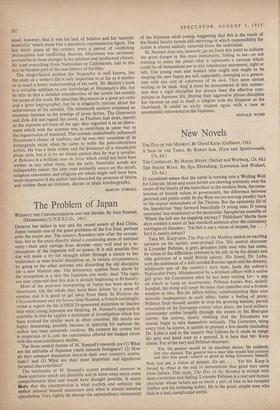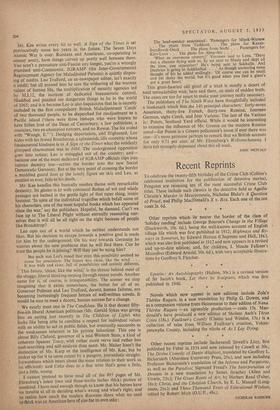New Novels
THE DAY OF THE MONKEY. By David Karp. (Gollancz, 15s.)
IT sometimes seems that the novel is turning into a Wailing Wall for Liberals. More and more novels are chewing anxiously over the issues of the liberty of the individual in the modern State, the main- tenance of human values in government, the difference between personal and public truth. In the West we are moving steadily back to the engage atmosphere of the Thirties. But the optimistic lilfof the Spenderian 'Step forward beautifully 0 young men, 0 young comrades' has modulated to the pessimistic Spenglerian mumble of 'Where the hell are we stepping anyway?' Publishers' blurbs these days contain a more or less standard sentence after the customary catalogue of disasters : 'Yet this is not a vision of despair, for . . Isn't it, nearly always?
Take Mr. Karp now. The Day of the Monkey makes an exciting advance on his earlier, over-praised One. His central character is Lysander Pellman, a grey, graceless little man who has come, by virtue of the difficulties inherent in his job, to be the decent and able governor of a small British colony. His friend, Dr. Luba, with the assistance of a dull-minded Russian agent and the dreamy, adolescent son of the country's holy man, leads the colony's Nationalist Party. Misbehaviour by a drunken officer with a native girl gives the Communist what he has been waiting for : a peg on which to hang an insurrection. Pellman knows that, quietly handled, the rising will never be more than speeches and a broken window or two. But his fellow-whites, communicating their own neurotic inadequacies to each other, foster a feeling of panic. Pellman finds himself unable to stop the growing tension; partial evacuation of the European colony takes place; the local military commander rattles happily through the streets in his Bren-gun carrier; the natives, slowly realising that the Europeans are scared, begin to take themselves seriously. The Governor, using every trick he knows, is unable to prevent a few deaths (including Dr. Luba's) and in the inquiry that follows he is made to resign his post and hand over to a general. It is here that Mr. Karp cheats. For at the very end Pellman discovers : Yes, the general would be an excellent choice. He suddenly felt very pleased. The general was a man who would find patterns
and that was good—almost as good as being Governor himself. Not, you see, a vision of despair, for etc. . . . Yet Mr. Karp is forced to cheat at the end to demonstrate that good may come from failure. This aside, The Day of the Monkey is written with deep conviction and feeling. Lysander Pellman is a real and human character whose beliefs are as much a part of him as his rumpled clothes and his irritating habits. He is the good, simple man who fails in a bad, complicated world. Mr. Kee writes every bit as well. A Sign of the Times is set provocatively some ten years in the future. The Seven Days Atomic War is over. Russians and Americans, co-operating in uneasy amity, have things carved up pretty well between them. You aren't a premature anti-Fascist any longer, you're a wrongly premised anti-Communist. IGRAMP (the Inter-Governmental Regroupment Agency for Maladjusted Persons) is quietly dispos- ing of misfits. Leo Trafford, an ex-newspaper editor, isn't exactly a misfit; but all around him he sees the withering of the warmer values of human life, the multiplication of security agencies led by M.1.12, the increase of dedicated bureaucratic control. Muddled and puzzled are dangerous things to be in the world of 1965; and it is because Leo is also loquacious that he is secretly included in the first compulsory British Maladjustment 'Catch' of two thousand people, to be dispatched for readjustment to a Pacific island ('there were three bishops who were known to have fallen foul of the Dean of Canterbury, a few politicians, a musician, two ex-champion runners, and no Rowse. The list ended with "Waugh, E." '). Dodging deportation, and frightened, Leo hides with his friend .Broadstrop, a spinsterish, idle eccentric whose fundamental kindness is to A Sign of the Times what the suddenly glimpsed charwoman was to 1984. The underground opposition goes into action; Leo is smuggled out of the country; and— because one of the most dedicated of IGRAMP officials slips into human decency too—across the border into the new Social Democratic Germany. But at the very point of crossing the border a muddled guard fires at the lonely figure on skis and Leo, as puzzled as ever, falls to his death.
Mr. Kee handles this basically sombre theme with remarkable dexterity. Its gloom is lit with continual flashes of wit and whole passages are bathed in the gentle light of that rarer thing, ironic humour. 'In spite of the individual tragedies which befall some of his characters, one of the most hopeful books which has appeared since the war,' say the publishers. Hopeful, be damned. Can't we face up to The Liberal Plight without eternally reassuring our- selves that it will all be all right on the night because of people like Broadstrop?
Leo opts out of a world which he neither understands nor likes. But his decision to escape towards a positive goal is made for him by the underground. On his way towards Germany he worries about the new problems that he will find there. Can he trust the people he is joining? Will they just be using him?
But such was Lea's mood that even this possibility seemed no cause for pessimism. The future was clean, like the wind. . . . It was wide and clear, full of possibilities and entirely different. This future, 'clean, like the wind,' is the dream behind most of the shaggy, liberal thinking seeping through recent novels. Another name for it; of course, is irresponsibility. The sooner we stop imagining that it exists somewhere, the better for all of us. GOvernor Pellman and Leo Trafford, decent, human failures, are becoming increasingly frequent heroes of well-written novels. It would be nice to meet a decent, human success for a change.
We nearly meet one in The Candidate. He is that decent fifty- five .ish liberal American politician (Mr. Gerald Sykes was giving him an outing just recently in The Children of Light) who looks like being able to combine a respect for individual values with an ability to act in public fields, but eventually succumbs to the weaknesses inherent in his private behaviour. This one is about Billy Cleland, governor of a mid-Western State, a kind of coherent Spencer Tracy, with rather more verve and rather less soul-searching and self-analysis than most. Mr. Maher hasn't the dist,nction of Mr. Karp or the intelligence of Mr. Kee, but he makes up for it to some extent by a pungent, journalistic straight- forwardness which bears about the same relation to their work as an efficiently iced Coke does to a fine wine that's gone a little, just a little, wrong.
1 cannot pretend to have read all of the 895 pages of Mr. Ehrenburg's latest (two and three-tenths inches thick) picture of mankind. I have read enough though to know that his heroes have no trouble at all in deciding what's wrong and what's right; and to realise how much the modern Russians share what we used to think was an American love of size for its own sake : NICHOLAS RAEDURN The loud-speaker announced: 'Passengers for Minsk-Warsaw . . . The plane from 'Tashkent . . . The plane for Kazan- Sverdlovsk-Omsk . . . The plane from Sochi . . . Passengers for Kiev-Lvov . . . The plane for Alma-Ata . .
'What an enormous country,!' Voronov said to Lena. 'There was a chemist flying with us, he sat next to Musia and slept all the time, you remember? He's being sent to Sakhalin. And Dmitriev is going to Ashkhabad.. . .' As though answering some thought of his he added smilingly: 'Of course one can be small and yet shake the world, but it's good when you find a giant's got a great heart.'
This great-hearted old giant of a tract is mostly a desert of total unreadability with, here and there, an oasis of sudden truth. The oases are too far apart to make your journey really necessary.
The publishers of The Ninth Wave have thoughtfully included a bookmark which lists the 140 principal characters: forty-seven American, thirty-five French, thirty-two Russian, fourteen German, eight Czech, and four Various. The last of the Various is: Points, Scotland Yard official. While it would be interesting to examine the influence of Mr. Greene on the modern Russian novel—for Points is a Greene policeman's name if ever there was one—it's more germane perhaps to remark that we British account for only 0.71 per cent. of Mr. Ehrenburg's Weltanschauung. I have felt strangely depressed about this all week.



































 Previous page
Previous page